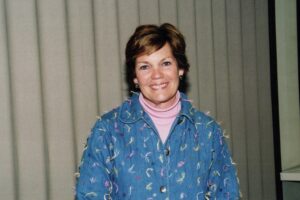Beth and Jim Schiff
JIM: As young parents, we didn’t have an established connection to any Cincinnati school, so we attended open houses, and it quickly became apparent that Seven Hills was the place that felt familiar and felt like home.

BETH: When our sons started at Doherty, Patti Guethlein was the principal and an amazing leader. There was also a very strong group of knowledgeable and seasoned teachers. Together, they created a cohesive environment that was warm, nurturing, and supportive, yet also academic and challenging. During all those years when my kids were there, I thought, How lucky are they to attend this school!

One of my favorite Doherty memories is when Hayden, our middle son, was in second or third grade. He had Sarah Roberts, this fabulous teacher, and she called on the morning of Halloween. We were scurrying around, trying to get our kids into their costumes and get to school on time. Hayden and his group of friends were obsessed with these stuffed animals called Ugly Dolls, which looked like little monsters. For Halloween that year, a group of the teachers decided to dress up like the Ugly Doll characters, but Sarah said they were worried their costumes weren’t quite good enough. Hayden had this collection of 10 different Ugly Doll stuffed animals. Sarah asked, “Do you mind if Hayden brings those in, and we’ll each carry the one that we are dressed up as.” I’m not kidding you, this was the most exciting moment in Hayden Schiff’s young life, seeing these teachers all dressed up like his beloved Ugly Dolls.
The fact that the teachers were paying attention and were so excited about what the kids were excited about — that’s what stands out. This is what was so important and impressive to us about Seven Hills, that the teachers got to know your child so well — as well as you knew them. This sounds corny, but the teachers and staff at Seven Hills helped us become better parents. Dealing with three rambunctious boys was not always easy, but the teachers were so reassuring and helpful.
JIM: As your kids get into Middle School, reality sets in, and you realize that perhaps things aren’t going quite as well in their lives as they were a few years before. Becoming an adolescent is tough. That’s when I thought Seven Hills was particularly good and supportive. The school is so adept at handling the challenges that adolescents face. They really let kids be themselves. There was less pressure to fit into some kind of preconceived mold. The kids at Seven Hills were better kids than my friends and I were in junior high and high school. And that’s largely due to the faculty, and the atmosphere they’ve created, along with the school’s values.

The most important thing in our lives at that time was our kids, so the school they attended became the most important institution to our family. This created a real desire to want to support the school and to give back whatever we could. The school was not only good for our kids, but also for us. If you were coaching a team or sitting on a committee, you wanted to be a good coach or a good committee member. The school was, to some strange degree, making us into better people. Everybody connected with the school was so good at doing their job that the more time you spent around them, the more you hoped it might rub off.
Beth: Being Board chair, you learn — even more so than you thought — how absolutely dedicated the faculty and administration are to the mission of the school. Jim’s a teacher, but I always worked in the business and legal community. Being around people who are involved in education, to me, they’re the best kind of people. They’re curious and fun, they enjoy life, and they’re so dedicated to something that’s important to us personally and also to the greater good of society.

JIM: At a time when we question how well schools work, and you see all the problems with primary and secondary education in this country, Seven Hills is the beacon on the hill. I feel more confident about what education can do because I’ve seen firsthand one of the best possible models. It’s not an easy model to replicate, but spending time at Seven Hills gives you hope.
BETH: I was Board chair when The Schiff Center was being planned, and then the execution happened after I stepped down. It turned out so much better than any of us could have ever expected. The first year after Ben, our youngest, graduated from Upper School, I’d be in my car doing something in the neighborhood and think, I’m just going to swing by Seven Hills and see how the building is going. I’d sneak by and peek around. It was a thrill to see it go up.

JIM: I was reluctant initially to see our family name on a building, but to have a center that works so well and that hosts kids performing on stage — it’s a great delight and honor.
But when I think of being at Seven Hills all those years, there are so many other things that I’m even more proud of. I remember being on the Board when the school was less diverse. We had 14% students of color, and we wanted to change that, but weren’t always sure of what steps to take. Now we have about 38% students of color. That’s a significant difference that occurred because of the efforts of so many. There was also the issue of faculty salaries. Not too long ago, our faculty were being compensated at about 70% of the ISACS benchmark. This was wrong, and we wanted to change it. That said, it would require millions of dollars to do so. A campaign was launched, and it succeeded. Now our faculty salaries are around 99% of the ISACS benchmark. Being part of a Board that raised money not just for bricks and mortar but also for our two most important constituencies — the students and the faculty — those mean the most to me in terms of how the school has progressed as an institution.
While our sons were at Seven Hills, we lived on two different streets and in neither case were we within a mile of the school. But our neighborhood was the school, it wasn’t the street that we lived on. When we were on campus, it felt like home. You’d want to wander around and see people. Some days, after drop-off at Doherty, you’d stay an extra 20 minutes talking to other parents, who became good friends. It was almost like being in a small town where you know everybody. It became the place we wanted to be.

BETH: Now that our kids have all graduated, I miss that day-to-day involvement and the rhythm of the school and seeing all the families who you went there with. You miss the people.
JIM: There are these wonderful, nostalgic moments, and we feel so lucky to have had them. You can’t go back and do it again, but you’re grateful for what transpired. And you have the sense that maybe those years were, in many respects, a peak experience of community in your life.

